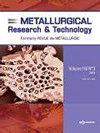刀具偏移对异种铜-黄铜搅拌摩擦焊组织和力学性能的影响
IF 1.1
4区 材料科学
Q3 METALLURGY & METALLURGICAL ENGINEERING
引用次数: 1
摘要
研究了刀具偏移量对异种铜黄铜搅拌摩擦焊接接头力学行为和组织的影响。为此,采用FSW方法对三种不同刀具偏移位置的连接进行了加工,即中心线(无偏移)、铜侧和黄铜合金侧。采用光学显微镜(OM)和扫描电镜(SEM)对试样的显微组织和断口形貌进行了观察。利用拉伸、显微硬度和弯曲试验对接头的力学性能进行了评价。结果表明:刀具向铜侧偏置时形成了一个洋葱环区,而刀具向黄铜合金侧偏置时则没有形成洋葱环区。此外,与未偏置刀具相比,刀具偏置铜侧1 mm (Cu+1)时抗拉强度提高了33.33%,刀具偏置黄铜合金侧1 mm (brass +1)时抗拉强度提高了57.47%。弯曲试验结果表明,在黄铜+1试样中,弯曲强度比没有偏移的试样提高了约5%。结果表明,当刀具向黄铜合金侧偏移1 mm时,合金的力学性能和显微组织性能最佳。本文章由计算机程序翻译,如有差异,请以英文原文为准。
Effect of tool offset on microstructure and mechanical properties of dissimilar copper-brass friction stir welding
This study has investigated the effect of tool offset on the mechanical behavior and microstructure of dissimilar copper and brass joints by friction stir welding (FSW). In this regard, the FSW method was used for joint with three different tool offset positions, namely center line (no offset), the copper side, and the brass alloy side. Microstructure and fracture surfaces of the specimens were examined by optical (OM) and scanning electron microscopies (SEM), respectively. Tensile, micro-hardness and bending tests were also utilized to evaluate the joints mechanical behavior. The results showed that an onion ring-shaped zone was formed with the tool offset towards the copper side, but this zone was not observed with the tool offset towards the brass alloy side. In addition, compared with the tool without offset, the tensile strength with the tool offset to copper side of 1 mm (Cu+1) increased by 33.33% and with the tool offset to brass alloy side of 1 mm (Brass+1) increased by 57.47%. The results of bending test showed that in the Brass+1 specimen, bending strength increased by approximately 5% compared with the specimen without offset. Finally, it was found that the best mechanical and microstructural properties were obtained by the tool offset of 1 mm towards the brass alloy side.
求助全文
通过发布文献求助,成功后即可免费获取论文全文。
去求助
来源期刊

Metallurgical Research & Technology
METALLURGY & METALLURGICAL ENGINEERING-
CiteScore
1.70
自引率
9.10%
发文量
65
审稿时长
4.4 months
期刊介绍:
Metallurgical Research and Technology (MRT) is a peer-reviewed bi-monthly journal publishing original high-quality research papers in areas ranging from process metallurgy to metal product properties and applications of ferrous and non-ferrous metals and alloys, including light-metals. It covers also the materials involved in the metal processing as ores, refractories and slags.
The journal is listed in the citation index Web of Science and has an Impact Factor.
It is highly concerned by the technological innovation as a support of the metallurgical industry at a time when it has to tackle severe challenges like energy, raw materials, sustainability, environment... Strengthening and enhancing the dialogue between science and industry is at the heart of the scope of MRT. This is why it welcomes manuscripts focusing on industrial practice, as well as basic metallurgical knowledge or review articles.
 求助内容:
求助内容: 应助结果提醒方式:
应助结果提醒方式:


